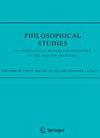寻求关闭的人工智能
IF 1.1
1区 哲学
0 PHILOSOPHY
引用次数: 0
摘要
我们建议开发以被关闭为唯一最终目标的人工智能。我们认为,这种人工智能安全方法有三个好处:(i)它有可能在强化学习中实现,(ii)它避免了一些危险的工具收敛动态,(iii)它为监控危险能力设置了绊线。我们还认为,该建议可以克服 Soares 等人(2015 年)提出的一个关键挑战,即寻求关闭的人工智能会操纵人类关闭它们。最后,我们将把我们的方法与 Soares 等人的可判性框架进行比较。本文章由计算机程序翻译,如有差异,请以英文原文为准。
Shutdown-seeking AI
We propose developing AIs whose only final goal is being shut down. We argue that this approach to AI safety has three benefits: (i) it could potentially be implemented in reinforcement learning, (ii) it avoids some dangerous instrumental convergence dynamics, and (iii) it creates trip wires for monitoring dangerous capabilities. We also argue that the proposal can overcome a key challenge raised by Soares et al. (2015), that shutdown-seeking AIs will manipulate humans into shutting them down. We conclude by comparing our approach with Soares et al.'s corrigibility framework.
求助全文
通过发布文献求助,成功后即可免费获取论文全文。
去求助
来源期刊

PHILOSOPHICAL STUDIES
PHILOSOPHY-
CiteScore
2.60
自引率
7.70%
发文量
127
期刊介绍:
Philosophical Studies was founded in 1950 by Herbert Feigl and Wilfrid Sellars to provide a periodical dedicated to work in analytic philosophy. The journal remains devoted to the publication of papers in exclusively analytic philosophy. Papers applying formal techniques to philosophical problems are welcome. The principal aim is to publish articles that are models of clarity and precision in dealing with significant philosophical issues. It is intended that readers of the journal will be kept abreast of the central issues and problems of contemporary analytic philosophy.
Double-blind review procedure
The journal follows a double-blind reviewing procedure. Authors are therefore requested to place their name and affiliation on a separate page. Self-identifying citations and references in the article text should either be avoided or left blank when manuscripts are first submitted. Authors are responsible for reinserting self-identifying citations and references when manuscripts are prepared for final submission.
 求助内容:
求助内容: 应助结果提醒方式:
应助结果提醒方式:


